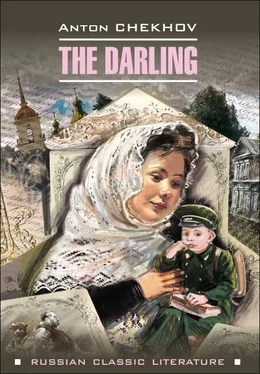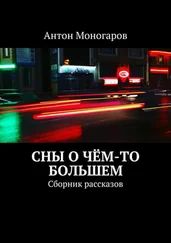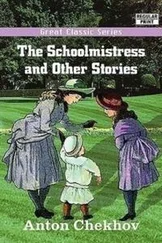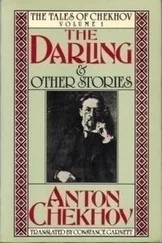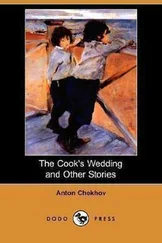Антон Чехов - The darling / Душечка. Сборник рассказов
Здесь есть возможность читать онлайн «Антон Чехов - The darling / Душечка. Сборник рассказов» — ознакомительный отрывок электронной книги совершенно бесплатно, а после прочтения отрывка купить полную версию. В некоторых случаях можно слушать аудио, скачать через торрент в формате fb2 и присутствует краткое содержание. Год выпуска: 2019, ISBN: 2019, Издательство: Литагент Каро, Жанр: Классическая проза, Русская классическая проза, Прочая научная литература, на английском языке. Описание произведения, (предисловие) а так же отзывы посетителей доступны на портале библиотеки ЛибКат.
- Название:The darling / Душечка. Сборник рассказов
- Автор:
- Издательство:Литагент Каро
- Жанр:
- Год:2019
- ISBN:978-5-9925-1149-9
- Рейтинг книги:5 / 5. Голосов: 1
-
Избранное:Добавить в избранное
- Отзывы:
-
Ваша оценка:
- 100
- 1
- 2
- 3
- 4
- 5
The darling / Душечка. Сборник рассказов: краткое содержание, описание и аннотация
Предлагаем к чтению аннотацию, описание, краткое содержание или предисловие (зависит от того, что написал сам автор книги «The darling / Душечка. Сборник рассказов»). Если вы не нашли необходимую информацию о книге — напишите в комментариях, мы постараемся отыскать её.
The darling / Душечка. Сборник рассказов — читать онлайн ознакомительный отрывок
Ниже представлен текст книги, разбитый по страницам. Система сохранения места последней прочитанной страницы, позволяет с удобством читать онлайн бесплатно книгу «The darling / Душечка. Сборник рассказов», без необходимости каждый раз заново искать на чём Вы остановились. Поставьте закладку, и сможете в любой момент перейти на страницу, на которой закончили чтение.
Интервал:
Закладка:
Besides Big Volodya, Little Volodya, and Sofya Lvovna, there was a fourth person in the sledge – Margarita Alexandrovna, or, as every one called her, Rita, a cousin of Madame Yagitch – a very pale girl over thirty, with black eyebrows and a pince-nez , who was chain smoking cigarettes, even in the bitterest frost, and who always had her knees and the front of her blouse covered with cigarette ash. She spoke through her nose, drawling every word, was of a cold temperament, could drink any amount of wine and liquor without being drunk, and used to tell scandalous anecdotes in a languid and tasteless way. At home she spent her days reading thick magazines, covering them with cigarette ash, or eating frozen apples.
“Sonia, give over fooling,” she said, drawling. “It’s really silly.”
As they drew near the city gates they went more slowly, and began to pass people and houses. Sofya Lvovna subsided, nestled up to her husband, and gave herself up to her thoughts. Little Volodya sat opposite her. By now her light-hearted and cheerful thoughts were mingled with gloomy ones. She thought that the man sitting opposite knew that she loved him, and no doubt he believed the gossip that she married the Colonel par dépit . She had never told him of her love; she had not wanted him to know, and had done her best to hide her feeling, but from her face she knew that he understood her perfectly – and her pride suffered. But the most humiliating in her position was that, since her wedding, Volodya had suddenly begun to pay her attention, which he had never done before, spending hours with her, sitting silent or chattering about trifles; and even now in the sledge, though he did not talk to her, he touched her foot with his and pressed her hand a little. Evidently that was all he wanted, that she should be married; and it was evident that he despised her and that she only excited in him an interest of a special kind as though she were an immoral and disreputable woman. And when the feeling of triumph and love for her husband were mingled in her soul with humiliation and wounded pride, she was overcome by a spirit of defiance, and longed to sit on the box, to shout and whistle to the horses.
Just as they passed the nunnery the huge hundred-ton bell rang out. Rita crossed herself.
“Our Olga is in that nunnery,” said Sofya Lvovna, and she, too, crossed herself and shuddered.
“Why did she go into the nunnery?” said the Colonel.
“ Par dépit ,” Rita answered crossly, with obvious allusion to Sofya’s marrying Yagitch. “ Par dépit is all the fashion nowadays. Defiance of all the world. She was always laughing, a desperate flirt, fond of nothing but balls and young men, and all of a sudden off she went – to surprise every one!”
“That’s not true,” said Volodya, turning down the collar of his fur coat and showing his handsome face. “It wasn’t a case of par dépit ; it was simply horrible, if you like. Her brother Dmitri was sent to penal servitude, and they don’t know where he is now. And her mother died of grief.”
He turned up his collar again.
“Olga did well,” he added in a muffled voice. “Living as an adopted child, and with such a paragon as Sofya Lvovna, – one must take that into consideration too!”
Sofya Lvovna heard a note of contempt in his voice, and longed to say something rude to him, but she said nothing. The spirit of defiance came over her again; she stood up again and shouted in a tearful voice:
“I want to go to the early service! Driver, back! I want to see Olga.”
They turned back. The nunnery bell had a deep note, and Sofya Lvovna fancied there was something in it that reminded her of Olga and her life. The other church bells began ringing too. When the driver stopped the horses, Sofya Lvovna jumped out of the sledge and, unescorted and alone, went quickly up to the gate.
“Make haste, please!” her husband called to her. “It’s late already.”
She went in at the dark gateway, then by the avenue that led from the gate to the chief church. The snow crackled under her feet, and the ringing was just above her head, and seemed to vibrate through her whole being. Here was the church door, then three steps down, and an ante-room with ikons of the saints on both sides, a fragrance of juniper and incense, another door, and a dark figure opening it and bowing very low. The service had not yet begun. One nun was walking by the ikon-screen and lighting the candles on the tall standard candlesticks, another was lighting the chandelier. Here and there, by the columns and the side chapels, there stood black, motionless figures. “I suppose they must remain standing as they are now till the morning,” thought Sofya Lvovna, and it seemed to her dark, cold, and dreary – drearier than a graveyard. She looked with a feeling of dreariness at the still, motionless figures and suddenly felt a pang at her heart. For some reason, in one short nun, with thin shoulders and a black kerchief on her head, she recognised Olga, though when Olga went into the nunnery she had been plump and had looked taller. Hesitating and extremely agitated, Sofya Lvovna went up to the nun, and looking over her shoulder into her face, recognised her as Olga.
“Olga!” she cried, throwing up her hands, and could not speak from emotion. “Olga!”
The nun knew her at once; she raised her eyebrows in surprise, and her pale, freshly washed face, and even, it seemed, the white headcloth that she wore under her wimple, beamed with pleasure.
“What a God’s miracle!” she said, and she, too, threw up her thin, pale little hands.
Sofya Lvovna hugged her and kissed her warmly, and was afraid as she did so that she might smell of spirits.
“We were just driving past, and we thought of you,” she said, breathing hard, as though she had been running. “Dear me! How pale you are! I … I’m very glad to see you. Well, tell me how are you? Are you dull?”
Sofya Lvovna looked round at the other nuns, and went on in a subdued voice:
“There’ve been so many changes at home … you know, I’m married to Colonel Yagitch. You remember him, no doubt … I am very happy with him.”
“Well, thank God for that. And is your father quite well?”
“Yes, he is quite well. He often speaks of you. You must come and see us during the holidays, Olga, won’t you?”
“I will come,” said Olga, and she smiled. “I’ll come on the second day.”
Sofya Lvovna began crying, she did not know why, and for a minute she shed tears in silence, then she wiped her eyes and said:
“Rita will be very sorry not to have seen you. She is with us too. And Volodya’s here. They are at the gate. How pleased they’d be if you’d come out and see them. Let’s go out to them; the service hasn’t begun yet.”
“Let us,” Olga agreed. She crossed herself three times and went out with Sofya Lvovna to the entrance.
“So you say you’re happy, Sonitchka?” she asked when they came out at the gate.
“Very.”
“Well, thank God for that.”
The two Volodyas, seeing the nun, got out of the sledge and greeted her respectfully. Both were visibly touched by her pale face and her black monastic dress, and both were pleased that she had remembered them and come to greet them. So that she might not be cold, Sofya Lvovna wrapped her up in a rug and put one half of her fur coat round her. Her tears had relieved and purified her heart, and she was glad that this noisy, restless, and, in reality, impure night should unexpectedly end so purely and serenely. And to keep Olga by a little longer she suggested:
“Let us take her for a drive! Get in, Olga; we’ll go a little way.”
The men expected the nun to refuse – saints don’t dash about in three-horse sledges; but to their surprise, she consented and got into the sledge. And while the horses were galloping to the city gate all were silent, and only tried to make her warm and comfortable, and each of them was thinking of what she had been in the past and what she was now. Her face was now passionless, inexpressive, cold, pale, and transparent, as though there were water, not blood, in her veins. And two or three years ago she had been plump and rosy, talking about her suitors and laughing at every trifle.
Читать дальшеИнтервал:
Закладка:
Похожие книги на «The darling / Душечка. Сборник рассказов»
Представляем Вашему вниманию похожие книги на «The darling / Душечка. Сборник рассказов» списком для выбора. Мы отобрали схожую по названию и смыслу литературу в надежде предоставить читателям больше вариантов отыскать новые, интересные, ещё непрочитанные произведения.
Обсуждение, отзывы о книге «The darling / Душечка. Сборник рассказов» и просто собственные мнения читателей. Оставьте ваши комментарии, напишите, что Вы думаете о произведении, его смысле или главных героях. Укажите что конкретно понравилось, а что нет, и почему Вы так считаете.
